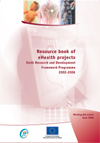 Sixth Research and Development Framework Programme 2002-2006
Sixth Research and Development Framework Programme 2002-2006
This booklet presents a compilation of the research projects managed by the ICT for Health Unit of the Information Society and Media Directorate General.The projects are funded under the Sixth Framework Programme for Research Development and Demonstration (FP6). It also explores in brief detail the proposed and potential future directions of the ICT for Health Unit, particularly under the umbrella of the Seventh Framework Programme (FP7).
Information and Communication Technologies (ICT) for Health (also known as eHealth) has the aim to significantly improve the quality, access and efficacy of healthcare. ICT for Health describes the application of information and communication technologies across the whole range of functions that affect the health sector. The European Commission has been supporting research activities in ICT for Health for almost two decades. This has placed Europe in a leading position in the use of regional health networks, electronic health records in primary care and deployment of health cards. These developments have contributed to the emergence of an eHealth industry
For further information and for the booklet download links, please visit: IST for Health :: Research :: Projects web pages